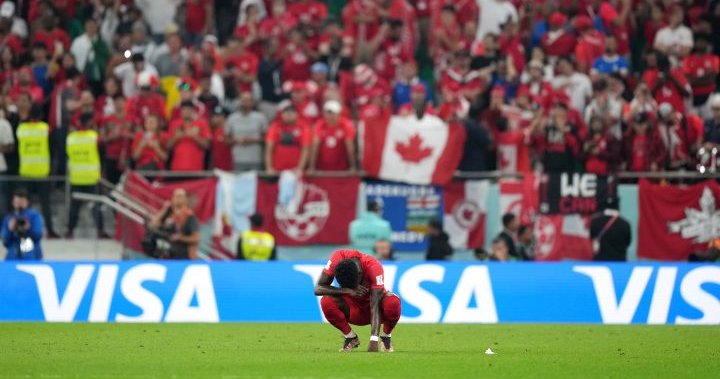According to the coach, John Herdman, the Canadian men leave the World Cup tournament with “our heads held high”. They also exit the world stage without a win, bottom of Group F and the second team to be eliminated.
It was a glass half full, half empty return to the tournament after a 36 year absence.
The draw was not kind to the 41st-ranked Canadians, pitting them against no. 2, Belgium, no. 12 Croatia and no. 22 Morocco.
READ MORE: Canada exits World Cup without a point after 2-1 loss to Morocco
There was plenty of class in Group F and it showed against Canada, in some games sooner rather than later.
Herdman’s side impressed against Belgium, rocking the Red Devils with an aggressive press and quick attack. Canada deserved to get something out of the game, and could have had Thibaut Courtois not saved an Alphonso Davies penalty.
However, the gloss on that bright opening performance was somewhat dampened when the Belgians suffered a nose dive in their next two games.

Davies redeemed himself with a historic goal 68 seconds into the next game against Croatia, a simple yet elegant touch play from goalkeeper Milan Borjan to Cyle Larin to Tajon Buchanan, whose lofted cross found Davies’ head as the star of Bayern Munich floated through the air.
READ MORE: After making history, Canadian soccer star Alphonso Davies opens up at World Cup
The Croatian midfield of Luka Modric (Real Madrid), Mateo Kovacic (Chelsea) and Marcelo Brozovic (Inter Milan) arrived at the tournament already with 27 World Cup matches under their combined belts. They held their own after conceding early and began to probe an undersized Canadian midfield, with Stephen Eustaquio nursing a sore hamstring and captain Atiba Hutchinson only recently back from a long injury layoff.
The Croatian midfield maestro found cracks that eventually led to a flurry of goals, ending Canada’s hopes of advancing at the tournament.
Against a motivated Morocco, the Canadian saw first-hand what happens when you make mistakes against quality opposition. You are being punished.
Canada forward Alphonso Davies (19) reacts after a loss against Morocco in Group F World Cup soccer action at Al Thumama Stadium in Doha, Qatar on Thursday, Dec. 1, 2022.
THE CANADIAN PRESS/Nathan Denette
Canada trailed 2-0 after 23 minutes, but after Herdman, whose dizzying tactical switches were worthy The exorcistmade a string of substitutions at the hour mark.
“In each of the three games, I think we had something to celebrate. We are a young team. We are developing,” said a positive Herdman after the Morocco game. “And it was a hell of an experience.”
READ MORE: Canadian men continue to chase soccer history in final outing at 2022 World Cup
Herdman used 19 players at the tournament, with 15 in the starting lineup. Six started all three games: Borjan, Alistair Johnston, Kamal Miller, Steven Vitoria, Buchanan and Davies.
Seven players, including the two backup goaltenders, did not see game action.
Buchanan leaves the tournament as perhaps the Canadian with the strongest reputation. The 23-year-old winger/winger from Belgium’s Club Brugge is elusive and exciting, the kind of attacker defenders don’t want to see coming their way.
It was only fitting that Davies, a world-class talent, ended Canada’s drought at the men’s tournament. One wonders what he might do if Canada gives him one position and tells him to go wreak havoc instead of moving him around the field like it’s a chessboard.

Eustaquio, when healthy, is the straw that stirs the midfield drink. And at Portuguese club Porto, he gets Champions League football — the kind of elite competition that helps prepare for the world stage.
Johnston, a full-back/wing-back who is believed to be on his way to Glasgow Celtic in the January transfer window, also impressed in Qatar.
“Now our players have been seen. Our coaching staff has been seen,” Herdman said.
“We know that people around the world look at this country and say, ‘Wow. They have some good young talented players.”‘
READ MORE: Johnston says Canadian men unfazed despite pressure ahead of World Cup showdown with Croatia
Exactly who Herdman, who is under contract until 2026, meant in the reference to the coaching staff is unclear.
But as one might expect, Canada has found the jump from CONCACAF to the world stage challenging. How successful it was in making the leap is a matter of opinion.
“We’ve always said the world level is the next level,” said Herdman, whose record dropped to 32-13-5 as he lost three straight to the Canadian men for the first time. “And I don’t think we were far.”
Canada scored 54 goals over 20 games in qualifying, second only to Japan’s 58. But it has two goals here, one of which was a Moroccan own goal.
According to FIFA, Canada launched 35 goal attempts with just six on target. His opposition had a total of 29 goal attempts, 15 of which were on target.
When it came to the stands, Canada rocked. The supporters’ support was loud, proud and impressive.
A few players will wave goodbye after the tournament. The classy Hutchinson is 39 while Vitoria is 35. Borjan, whose play has ranged from stellar to substandard, is 35 but could keep going if he wants to.
Hutchinson reached the 100-cap milestone against Croatia and deserves nothing but praise for his service to his country.
READ MORE: Canada to take home more than $10 million from FIFA after World Cup performance
Canada’s average age at the World Cup was 26.9, matching the tournament average. But 13 of Herdman’s 26-man roster were 25 or younger, including Davies, David, Eustaquio and Buchanan.
Herdman had a puzzling tournament himself. Known for his speaking and motivational skills, he sometimes appeared nervous in front of the world’s cameras and ran the gamut from awkward to cliché.
His rah-rah “We’re going and -eff Croatia” message to his players in the Belgian post-match huddle backfired. As one might expect, the proud Croats took it personally.
Herdman knew his team had next-level opposition here. Why does it give extra motivation?
One also wonders how long the Canadian men need to lean on Herdman’s much talked about “brotherhood”. Such bonds were arguably necessary in Canada’s climb up the world soccer ladder, uniting the team in a unified cause, as reflected by the choice of Drake’s “Started From the Bottom” as the soundtrack for the team taking the field for its opening against Belgium.
Elite teams are finely tuned machines rather than bands of brothers. They expect to win because they have the talent, mental strength and support needed to stay on top. And because they have done it before.
However, the Canadian players seem very loyal to their coach. He is doing something right.
The outlook ahead for the Canadian men is bright. As co-hosts of the 2026 tournament, they will not have to go through qualification – although this has yet to be confirmed by FIFA.
Herdman’s team will be able to choose its opponents. Teams will want to play Canada and maybe come to Canada, which will help fill Canada Soccer’s pockets.
The organization itself also has work to do.
With about 60 to 65 full-time staff members — U.S. Soccer has 249 by comparison — Canada Soccer was stretched thin as an overburdened World Cup qualifying campaign turned into a short runway to the World Cup.

It still managed to pull off wins off the field with a successful ticket lottery for Canadian fans and a “friends and family” travel package for the players that drew positive reviews. Now he must reach an agreement with his players on a labor agreement with US$9 million in prize money to be divided (Canada Soccer received another US$1.5 million from FIFA to prepare for the tournament).
Canada Soccer House, a poolside home away from home for Canadian fans, was a hit despite its $249 entry fee (which came with food and drink).
But as with previous competitions, Canada Soccer seemed subordinate to its players when it came to media duties. It took a mini-media uprising to get Davies in front of the cameras at the team’s training facility.
Successful companies don’t hide their assets. They make them available.
Canada Soccer also failed to do virtually anything in time for the tournament.
Being 41 minutes late for your first World Cup news conference in 36 years doesn’t look good. Herdman appeared both embarrassed and angry when he finally took the podium.
Before the Croatia match, an irate FIFA official shouted at the Canadian team to get in place for the traditional pre-match team photo so the game could kick off on time. The whole world was literally waiting.
There are lessons to be learned on and off the field before 2026.
Canada returns to action in March with CONCACAF Nations League matches, starting March 23 against No. 86 Curacao before hosting no. 80 Honduras. Herdman will have to sit out the Curacao match after receiving a red card in Honduras in June.




